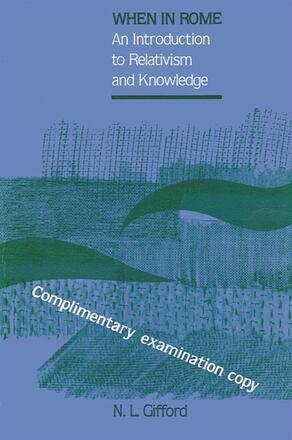
When in Rome
An Introduction to Relativism and Knowledge
Alternative formats available from:
Reviews
"The book deals with an issue that is intrinsically important (philosophical relativism) and with a topic that an introductory audience would find immediately interesting. In short, the author has succeeded in addressing a popular audience about an important problem that they will already be interested in because of the prevalence of relativism itself in contemporary culture. " — Carl G. Vaught, Pennsylvania State University
"A book of just this introductory sort, concerning relativism, appealing and usable by undergraduates in precisely this way, has been very badly needed for a long time. The book fills a very real teaching need. " — Patrick Grim, State University of New York at Stony Brook
"It deals clearly, sensitively, and very readably with one of the most pervasive, stubborn, and destructive assumptions among students beginning philosophy. " — Marcia Cavell Aufhauser, State University of New York College at Purchase